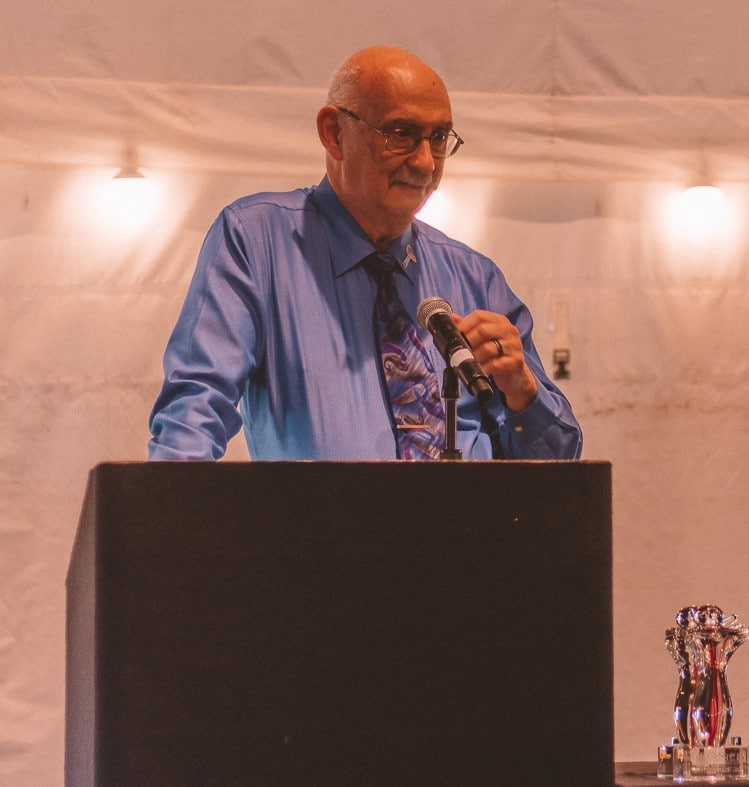Note: In recognition of the last day of Prostate Cancer Awareness Month, the start of HBOC Week and in advance of Previvor Day, FORCE wants to remind people that men can be previvors too. Like women, men account for half of all mutation carriers. Male mutation carriers face challenges associated with their high risk for cancer. Yet men are less likely to be told about and to undergo genetic testing. FORCE volunteer, Dave Bushman shares his personal story as a male previvor.
by Dave Bushman
Although men and women have an equal chance of carrying a genetic mutation that increases their risk of developing cancer, most of the people who actually have to deal with being a carrier are women.
While men also can carry a genetic mutation, they are less likely to talk about it with their family, less likely to share that information with other men and less likely to seek medical guidance to help them deal with being a carrier. This is also true for men who carry a genetic mutation and who develop cancer.
I always knew that there was cancer in my family – my mother died of breast and ovarian cancer at 42. However, I didn’t realize the extent that cancer permeated my family or that it could affect me until my sister got tested and learned that she carried the BRCA1 genetic mutation 187delAG.
After speaking with her, I got tested and learned that I also carried that mutation. I didn’t think much of it at the time but I informed both my son and daughter and suggested that they be tested.
My son’s test was negative but my daughter found out that she too had the mutation. I was greatly concerned for my daughter, who was 34. Moreover, I felt extremely guilty for passing along the mutation to her. I knew that it was irrational to feel that way but I couldn’t help it. When I told my daughter about my feelings of guilt, she said, “I understand, but think of all the wonderful genes you gave me”.
My immediate concern was for my daughter but I also had to think about my own risk. As a male, I learned that my risk was pretty low compared to the risk that women with a mutation faced. Still, as I discovered more and more information about family members who had cancer, I knew that I could not completely ignore my own risk.
I learned that as a BRCA1 carrier, I was at a slightly increased risk of breast cancer, prostate cancer and pancreatic cancer. I was 67 when I learned I carried the mutation. I started going to my family doctor for regular examinations. Due to a chronic enlarged prostate, I had been going to my urologist regularly for many years. I was pretty sure that I did not have cancer but I knew that I would have to become more aware of my physical condition.
One day a few years afterward, my wife noticed a small bruise on my left breast near the nipple. I touched the area and felt a hard mass I had not noticed before. I promptly called my family doctor, who, after examining me, immediately sent me to the breast center in his building.
Entering the breast center felt strange and a little weird. This was a place for women – what was I doing there? Everything was pink, including the gown I was given to wear. They did make me feel a little less uneasy by telling me that they were used to having men come there, although the only men there at the time were waiting for their wives.
After discussing my personal and family history, I was given a mammogram, an ultrasound and a needle biopsy. I had always heard women talk about how uncomfortable and even painful mammograms were but women have breasts. How were they going to do a mammogram on me, a male? Well, I found out and immediately developed a new and healthy respect for women who had to undergo regular mammograms. I became convinced that the mammogram machine was designed by the Marquis de Sade.
Fortunately, the results of my mammogram, ultrasound and needle biopsy were all negative. They said that it was just a pooling of dried blood. I went back three months later for a repeat mammogram and ultrasound and, once again, they were negative.
I continue to monitor my health and from what have learned and experienced, I have created The BRCA Brotherhood Facebook group for men who face the same issues as me. As a male, finding out that I carry a genetic mutation was not fun but it was important for me and my family to know. I am a proud previvor.

Dave Bushman, 76, is a former high school social studies teacher and attorney - he lives in Fort Lee, New Jersey with his wife Jessie. Dave became involved with FORCE in 2011 after learning that he, his daughter, his sister and his niece all carried the BRCA1 genetic mutation. Since then, he has worked with FORCE to spread the word about hereditary cancer and how it affects men.
